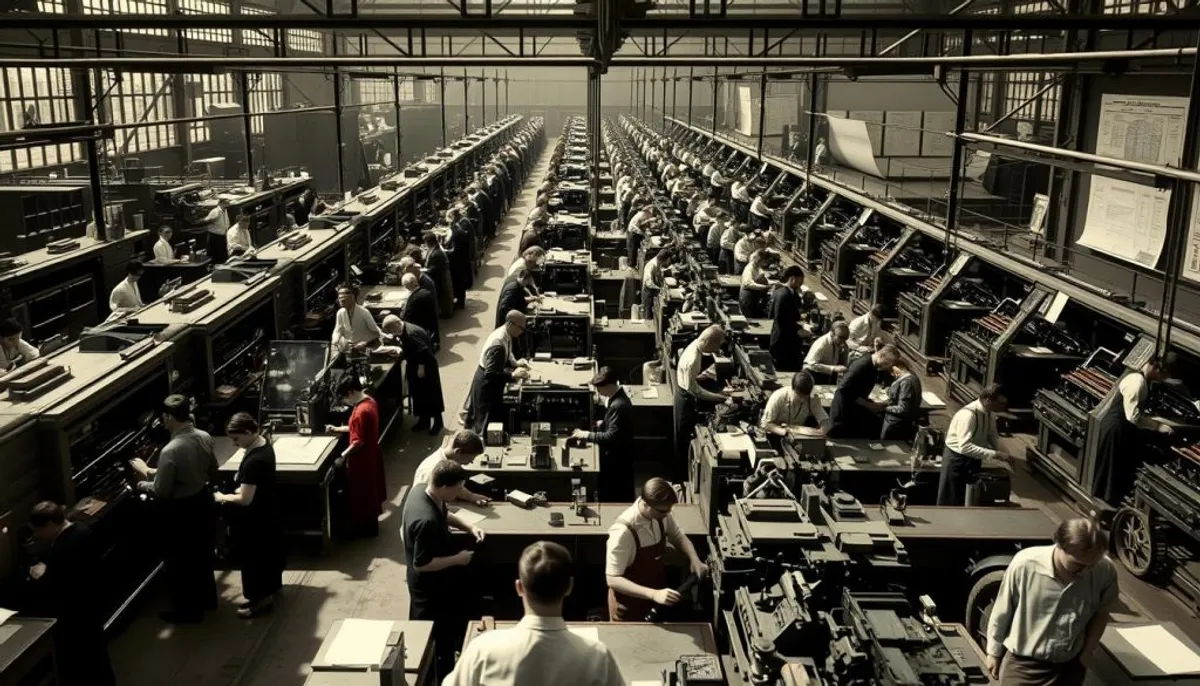The corporate culture, a captivating concept, determines the identity and behavior of a company. It emerges from the company's history and transforms over time. In France, this idea emerged in the 1980s, influenced by the paternalistic culture of the 19th century.
The organizational values are at the heart of this culture. They shape solidarity within the team and stimulate employee motivation. A study reveals that 88% of people believe that having a unique culture is essential for a company's success.

The influence of corporate culture is profound. Companies with a dynamic culture are 21% more productive. Moreover, 60% of employees are more likely to recommend their company if the culture values their well-being.
The formation of corporate culture is a complex process. It draws inspiration from collective experiences, past decisions, and key figures within the company. These elements form a distinct identity that defines each organization.
The history and emergence of corporate culture
Corporate culture, a pivot of contemporary management, is part of the evolution of organizational practices. It illustrates the profound transformations in the vision of the role of humans within companies.
The historical origins of the concept
The 19th century saw the emergence of the first paternalistic practices, precursors to corporate culture. The 20th century witnessed the development of the concept, influenced by American and Japanese culturalism. In France, it became established in the 1980s, marking a turning point in human resource management.
The influence of Taylorism and its questioning
Taylorism, dominant in the early 20th century, profoundly structured work. Its questioning was crucial for the emergence of corporate culture. This evolution placed humans at the center of managerial concerns, paving the way for new approaches.

The evolution towards a modern notion
Today, corporate culture is a fundamental tool for management and diagnosis. It remains complex and constantly evolving, requiring adaptation to economic, legal, and technological changes. High-performing companies, such as Decathlon in France, integrate strong values like vitality and responsibility into their culture. This demonstrates the importance of this aspect in organizational success.
| Type of culture | Characteristics |
|---|---|
| Clan | Family-oriented, collaborative |
| Adhocracy | Innovative, flexible |
| Market | Competitive, results-oriented |
| Hierarchical | Structured, procedural |
How corporate culture is born and formed
Corporate culture is an essential pillar for the success of an organization. It evolves over time, influenced by a multitude of factors and actors. It is crucial for leaders and employees to grasp its evolution.
The fundamental role of founders
The founders of a company have a decisive impact on the culture. Their vision, values, and behaviors mark the early stages of the company. Gérard Mulliez, for example, instilled modesty and regional attachment at Auchan.
The impact of collective experiences
Shared experiences shape the culture of a company. Moments of success and failure, as well as crises and major changes, influence collective norms and behaviors. These experiences form stories and myths that reinforce the company's identity.
The gradual construction of values
The construction of values is a continuous process. It develops through daily interactions, decisions, and valued behaviors. Moral, ethical, and environmental values must be shared and lived to anchor themselves in the culture.

| Elements of corporate culture | Concrete examples |
|---|---|
| Values | Integrity, innovation, social responsibility |
| Rituals | Weekly team meetings, annual celebrations |
| Symbols | Logo, dress code, office layout |
| Myths | Success stories, anecdotes about the founders |
The birth and formation of corporate culture are dynamic processes. They require constant attention from leaders to ensure their coherence with the strategy and objectives of the organization.
The essential components of corporate culture
Corporate culture is formed by fundamental elements that define its identity and functioning. These components profoundly influence behaviors, decisions, and the work environment.
The fundamental values and principles
The values of a company form the basis of organizational culture. They guide the actions and choices of employees. A study by Robert Half in April 2024 reveals that 14% of candidates prioritize a job offer for its values. Meanwhile, 18% would refuse an offer if the values do not match their own.
The organizational rites and symbols
The organizational rites reinforce cohesion and collective identity. The company symbols, such as the logo or office layout, visually embody the culture. These tangible elements allow employees to identify with the organization and create a sense of belonging.
The language and common codes
A specific vocabulary and shared codes of conduct develop within each company. This common language facilitates internal communication and strengthens employees' sense of belonging.
The myths and heroes of the company
The myths of the company and iconic figures play a crucial role in transmitting values. These inspiring stories motivate employees and concretely illustrate the culture of the organization.
| Component | Role in corporate culture | Impact on employees |
|---|---|---|
| Values | Guide decisions | 23% would leave their job for one more aligned with their values |
| Rites | Reinforce cohesion | Create a sense of belonging |
| Symbols | Embodiment of visual identity | Facilitate identification with the company |
| Language | Facilitate internal communication | Enhance team spirit |
| Myths | Transmit values | Inspire and motivate employees |
The strategic role of corporate culture
Corporate culture is essential to the success of contemporary organizations. It determines the identity of the company and shapes its daily functioning. A strong culture becomes a strategic asset, influencing several aspects of the company.
A vector of cohesion and engagement
A well-defined corporate culture strengthens cohesion and engagement within the team. It gives meaning to work and enhances the sense of belonging. Companies with a collaborative culture are particularly appreciated by their employees. This translates into better performance and increased well-being at work.
A tool for differentiation in the market
Corporate culture is a powerful factor of competitive differentiation. Companies like Google or Decathlon stand out for their unique culture. This affirms the values and personality of the company, strengthening its brand image with customers and partners.
A factor in attracting talent
A strong culture is crucial for attracting talent. Increasingly, candidates choose their employer based on values. A study reveals that 14% of candidates prioritize a job offer based on values. Conversely, 18% would refuse a position if the company's values do not align with their own. Therefore, corporate culture is a key element in recruitment and retention.
RelatedRelated articles


